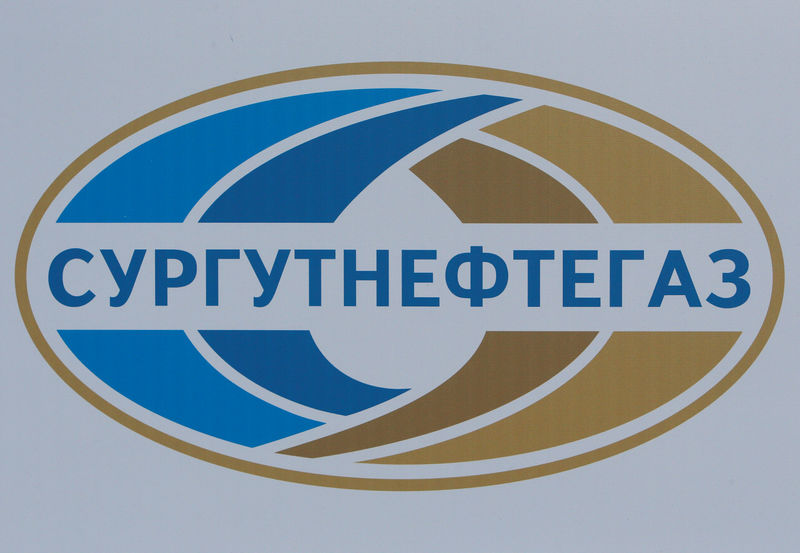By Gleb Gorodyankin and Olga Yagova
MOSCOW (Reuters) - Russian oil producer Surgutneftegaz (MM:SNGS) is pushing buyers to agree to pay for oil in euros instead of dollars if the need arises, apparently as insurance against possible tougher U.S. sanctions, traders who deal with the firm told Reuters.
Russia has been subject to Western sanctions since its 2014 annexation of Ukraine's Crimea region, but Washington has threatened to impose extra sanctions, citing what it has called Moscow's "malign" activities abroad.
The prospect that causes most alarm for Russian firms is inclusion on a Treasury Department blacklist that effectively cuts them off from conducting transactions in dollars, the lifeblood of the global oil industry.
Surgutneftegaz, whose chief executive Vladimir Bogdanov is already on a U.S. blacklist in a personal capacity, declined to respond to Reuters questions.
"We do not comment on our commercial activity," said the company, Russia's fourth largest by output.
To date, Russia's oil industry has been able to weather Western sanctions. In response to restricted access to Western finance and technology, firms have switched to borrowing from Russian state banks and developed their own technology.
Most Russian oil majors, including Rosneft and Lukoil, also sell the lion's share of output via long-term contracts with clients, giving them more time to work out alternative forms of payment when the contracts expire.
But most of Surgutneftegaz's exports -- around 2 million tonnes per month -- is sold through monthly tenders on the spot market, the largest volumes by far among its Russian peers. So it would have only around 30 days to find alternative payment methods.
"AVOIDING PROBLEMS"
Six traders who regularly deal with Surgutneftegaz said the company had been asking buyers to agree to an addendum to their contracts stating that they accept the option of settling payments in euros.
According to a message sent by Surgutneftegaz to one of its customers asking them to sign the addendum, the oil company cited the need to "avoid any possible problems with payment in USD." Reuters has seen a copy of the message.
Three of the traders said Surgutneftegaz had already begun discussions with its partners last summer about the possibility of settling payments in euros.
But the company was now raising the issue with greater urgency, and had in some cases warned it would reject bids from buyers for cargoes of oil unless the buyers signed the addendum, according to four of the traders.
In its message to customers, Surgutneftegaz did not mention the risk of new sanctions, but two traders said from their interactions with the company it was clear to them that this was the reason behind the change.
"Surgut is afraid of sanctions," a source in a European oil major which has dealings with Surgutneftegaz told Reuters, on condition of anonymity because he is not authorized to speak to the media.
The U.S. government cannot forbid anyone from using dollars, but it can prevent U.S. banks from doing business with a sanctioned entity.
Most dollar-denominated transactions pass through the U.S. banking system, and those banks, to avoid violating sanctions, can refuse to handle money linked to blacklisted companies or individuals.
It is not clear how widely the Russian oil sector is preparing for the possibility of tougher sanctions.
A source at Gazpromneft, Russia's third-biggest oil company by output, said most of its contracts already contained a clause on possible payments in non-dollar currencies.
A second source at the company said that when it is drafting supply contracts with customers for 2019, it will make sure they include a non-dollar payment option in all cases.
Gazpromneft was not immediately available to comment.
Several other oil firms also already have clauses in their contracts allowing non-dollar payments under some circumstances, said four industry sources.
TURNING UP THE HEAT
Washington's decision in April to include on its sanctions blacklist Russian firm Rusal, one of the world's biggest aluminum producers, signaled to Russian business that Washington was ratcheting up the pressure.
It was the first time a major Russian company with international partners had been blacklisted.
Some elements of the sanctions have been temporarily watered down, but Rusal's inclusion has disrupted its access to raw materials, led to the cancellation of some orders and prompted some foreign partners to sever ties.
Washington has not spelled out when or how it plans to toughen sanctions further, but it has signaled that they are coming this year, partly in response to the poisoning in Britain of former Russian spy Sergei Skripal and his daughter.
Britain and its Western allies say Russian intelligence agents carried out the poisoning using a military-grade nerve agent, an allegation Moscow has denied.
State Department official Manisha Singh said this month there would be a "very severe second round of sanctions" unless Russia meets a November deadline to comply with international chemical weapons law.
The source in the European oil major said Surgutneftegaz, in its push to arrange the option of payments in euros, was focused on what might happen in November.
There is no indication from Washington if Surgutneftegaz would be a target for the next round of sanctions.
But CEO Bogdanov was included on the Treasury Department list, published in January, of Russian oligarchs with a net worth of $1 billion or more.
In April, the Treasury Department added Bogdanov to its "Specially Designated National" list, freezing any U.S. assets he owns and barring him from travel to the United States.
It said he was being blacklisted "for operating in the energy sector of the Russian Federation economy."
